|
Posted by Romy the Cat on
05-23-2006
|
|
In a post a few days ago I mentioned that I am planning to experiment with a dedicated “fundamentals channel” putting the bottom of Vitavox S2 driver in the game.
http://www.goodsoundclub.com/TreeItem.aspx?PostID=2431
Whoever dealt with spherical horns know the sacrifices we the spherical people go in order to win imaging. Also the real-estate-wise adding one extra round horn is a nightmare apocalyptic proportion. Of course I am kidding but still… I love what Macondo does now with imaging but I am truing to estimate what other spherical horn would do. We know that hearing has very high sensitivity for horizontal offset of sound source but it kind of the frequency depended as well. The alien spherical will be crossed at 6dB/octave at ~1000Hz. So, what would it do to imaging? Make your bets and proposals.

|
|
|
|
Posted by drdna on
05-25-2006
|
Romy,
I was really shocked when I saw this idea of yours. It is a trade off of course with improved control over narrower frequncy bands being traded for axial symmetry. Yet because the position of the drivers is so very important, I am sort of stunned you are making this proposal which makes your Macondo look like so many other horn enthusiasts patched together systems I have seen on AA, etc.
I understand the advantages of doing this of course, but given the difficulties of executing it correctly and your concerns about speaker placement, time alignment, DPOLs, etc. I am surprised you would go this route.
What deficiency in your system compelled you to do this and what convinced you that you could make a big enough improvement to offset to disadvantages?
Good luck with that, Adrian
|
|
|
|
Posted by Romy the Cat on
05-25-2006
|
|
Thinking about my Vitavox S2 “fundamentals channel” I can’t stop think about my hypostatic view about the horns. Year after year I was mucking what GOTO does when they introduces a horn for a couple octaves. Ironical now I am truing to do the same for upper bass and lower mid range.
Yes, I do feel hippocratic about it. Still, my ideas is to use S2-LF+S2-HF is because the specific limitation of the Vitavox S2 driver. If the Vitavox S2 would be able to handle properly from 500Hz and up, and with the very same diaphragm then I would not need to separate this driver into two channels. From a different prospective a single horn from 500Hz to, I would say, 12,500Hz is by it’s wide bandwidth nature is a severally compromised horn… So might be the GOTO guys are on something by breaking it up?
It would be hard to say as GOTO use their own drivers and unless I would play with them it would be hard to say anything defiantly. Also, my coming experiment with LF section of S2 will not prove anything as I look forward to the very specific results and in the very specific application. Still, what motivated GOTO or ALE to break the channels beside their desire to sell more drivers?
Rgs,
Romy the caT
|
|
|
|
Posted by Romy the Cat on
05-25-2006
|
 drdna wrote: drdna wrote: | I was really shocked when I saw this idea of yours. It is a trade off of course with improved control over narrower frequncy bands being traded for axial symmetry. Yet because the position of the drivers is so very important, I am sort of stunned you are making this proposal which makes your Macondo look like so many other horn enthusiasts patched together systems I have seen on AA, etc.
I understand the advantages of doing this of course, but given the difficulties of executing it correctly and your concerns about speaker placement, time alignment, DPOLs, etc. I am surprised you would go this route.
What deficiency in your system compelled you to do this and what convinced you that you could make a big enough improvement to offset to disadvantages? |
|
Adrian,
Good questions and very reasonable censers. I have the very same concerns. I do not have answers at this point and what I am planning to do will be pure excrement in order to see what happen. My objective is to get the S2’s bottom kneed tone and to get manual control over the “fundamentals range”. What S2 did at the bottom in that Vegas installation that I mentioned above was amassing. I call it “contrabassoon effect”… it hard to explain it, it should be heard….
The major question is how much I should pay for it in imaging. I do not care about the time alignment, speaker placement or DPOL. Defiantly it will be aligned and taken care. I thought about it before I dived into this project. My primary concern HOW it will screw up imaging and the fact that this arrangement might force to go for a higher order filters. Definably it would be bad, but at this point I do not know.
The only way to learn it to put it all onto the game and to play with it for a while trying to make it to sound correct. If it will not work then it will not work. I have to see how much gain and lost it will be and how the system will act in “whole”… There is another thing…. The axial symmetry is important thing for higher frequency but for lower frequency the axial asymmetry is quite beneficial. I made many experiments about it in past introducing the intentional axial asymmetry at LF and was able to get very interesting results. Still, at that time I was plating with 60Hz. How the axial asymmetry will work at 700-800Hz I do not know.
It does not bother me how Macondo looks like and that it appears, for a naked eye, similar to some AA installations. I have reasons to feel that they and I have different reasons and different motivations…
Rgs.
Romy
PS: BTW, I still consider placing the new “fundamental channel” 1.5” feet above the tweeter… It will be tried and evaluated as anything else…
|
|
|
|
Posted by slowmotion on
05-25-2006
|
Hi all
I dont know why Goto do what they do...
But if we imagine using only the - good - part of a "perfect" horn/driver combination we will find that the bandwidth will be very small.
About two octaves probably...
Think about it; most compression drivers use resonances ( in diaphragms and suspension ) to expand the usable bandwidth upwards. If we decide to use drivers that don't rely on this type of resonances to expand bandwidth we will end up with the typical Goto 5-6-7 way systems.
|
|
|
|
Posted by Romy the Cat on
05-25-2006
|
|
Actually Goto does not have default 5-6-7 way systems. I have seen that they recommend 4 ways systems. Definably in the fields the dealer and distributor load their ignorant customers with as much drivers as possible selling them 55 ways systems. I have seen/heard one such a system in NY: many drivers chaotically connected and randomly placed together…. with the consequential sonic result…
I disagree with you, Jan, that the compression drivers use resonances. Usually the compression drivers hide primary resonance behind the horn’s cut off. If the drivers use resonances to expand the usable bandwidth upwards then they called the crappy drivers. Well, they do not really USE resonances to expand the usable bandwidth. They juts have resonances and no one care about them because no one makes them “for sound” but rather “for pressure”, and no one cares how those drivers would perform in high demands of home installations…
I brought the GOTO to my “fundamentals channel” thread because Goto does a driver that no one else has: SG570. This driver meant to be operated from 300Hz to 2kHz and suggested from 300Hz to 1kHz. As I understand it should be a part of 6-ways installation, as below 300Hz you must have at least 3 channels and the way in which GOTO breaks around 7-8kHz it should have 3 channels above. I never seen any set ups where this driver was used and was not able to observe what people try to do with this driver. It is possible that this driver is juts a tribune to the GOTO midbass horn. The GOTO horns are horrible and they use for midbass and upperbass exponential horns with low profiles – means honk, honk, honk, honk…
Still, I doubt that GOTO went for the theoretical 300Hz to 1kHz channel just to handle the limitation of their drivers. They use this own drivers and they could do with them whatever they need to. However, my interest was not about the GOTO's design ides but to understand where they use such a lower midrange channel (the fundamentals channel) in context of a system's real estate. That actually what my initial post in this thread was all about. I am very confident as now that I will make my fundamentals channel to sound good (the prototype works very nice) but I am also confident that to incorporate such a channel in the Macondo will be complicated.
Rgs,
Romy the Cat
|
|
|
|
Posted by Wojtek on
05-25-2006
|
|
Why can't you just stack them inserting new horn in between midbas and midhorn and keeping your original arrangement? Since your midbass sits on the floor, the tweeter still should be on resonable hight.I would transform your full range Melquiades for bass duty and use super Melq. for the rest band. Lucky you with all your toys.
|
|
|
|
Posted by Romy the Cat on
05-25-2006
|
|
Sucks! I made today my conical prototype and loaded it with S2 band-crossed at 500Hz and 900Hz. Pretty much wherever I placed this horn except directly above the tweeters it screwed imaging. To mount it directly above the tweeters does not look plausible as to hand the channel at 6-7 feet high would make a lot of mess with armature and would make the Maconco contrived and not allegiant…. At this point without having a proper horn I am not planning to move speaker but it kind of made me to think…
The tratrix horn is being made and will be here in two-tree weeks. The tratrix will be way better working by the nature of being tratrix but it also will have a larger (less convenient would be more precisely to say) mouth that would make it even more ugly to integrate. From what I detect now the “fundamentals channel” horn with 17” mouth in order do not screw the MF channel (the mouth is extended a few inches forward) should be ~25” away and it is too much for my nearfield setting.
Rgs,
The Cat
|
|
|
|
Posted by Romy the Cat on
05-26-2006
|
 Wojtek wrote: Wojtek wrote: | | Why can't you just stack them inserting new horn in between midbas and midhorn and keeping your original arrangement? Since your midbass sits on the floor, the tweeter still should be on resonable hight.I would transform your full range Melquiades for bass duty and use super Melq. for the rest band. Lucky you with all your toys. |
|
Well, it was my original idea. Unfortunately it did not work.
The MF horn with S2 produces a primary identifiable sound source and it should be at a certain height relative to a default listening level. I personally prefer when a center of the “supper image” is slightly higher then ear level. I like to look up very slightly at the “supper image” and I prefer when the level of the primary identifiable sound source is somewhere at the tip pf the head level. So, I relay can’t not to move the MF channel up. Currently I have 12” between upperbass and MF. The “Fundamentals Horns” is around 17” but the biggest problem that it has the mouth of the upperbass horn in the way. I was for a long time brewing is idea of oval tratrix that would be able to sit horizontally between the upperbass and MF but then I learned that those horns should sit free and far form each other at least 1.5-2 times of the mouth size. So, to pile up the horn like sardine in a can (even if I were able to do it) would be not a good idea….
Rgs,
Romy the caT
|
|
|
|
Posted by Romy the Cat on
05-26-2006
|
|
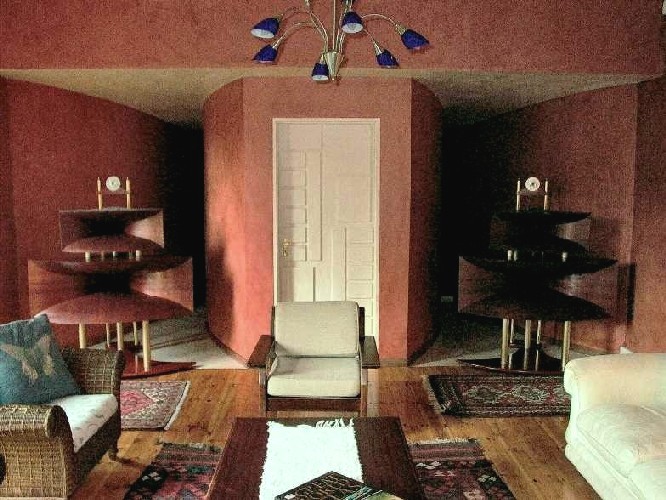
Above the Johan Dreyer from South Africa uses a sort of Fundamental Channel for his installation. He obviously lucking one more channel to integrate his LS section and the Fundamental Channel. His Lower Mid charnel should be twice larges and sit on the floor (effectively gaining some dBs) - he has enough space but perhaps the driver that he used in his lower horn would not handle it.
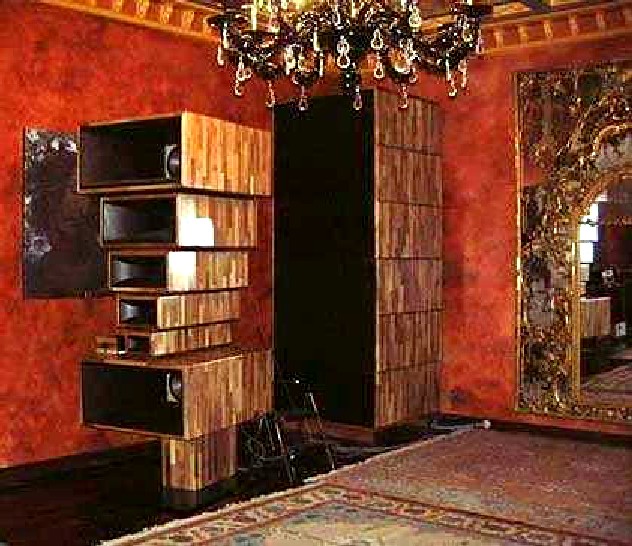
Above is a solution of Jean-Yves from France. A Fundamental Channel is made aground TAD drivers, that I believe are not suitable for this role, but still the Fundamental Channel was used. Unfortunately with those French people it is never understandable why they do what they do. It is very possible that Jean-Yves found that his Fundamental Channel makes a good table to cut the Rockford cheese…. I am sure I an right on it...
Rgs,
The Cat
|
|
|
|
Posted by Romy the Cat on
05-27-2006
|
|
I made today some interesting experiment and for the first time during my “fundamentals channel saga” I get some stimulating and very result. I find a way to mount the “low frequencied S2 driver” on the speaker’s axe way above the Macondo’s tweeter. It kind of look menacing but sonically it sounds not only not-bad but even advantageous.
The advantage comes form the way in which I trued to drive it. I drive the upperbass horn and the new prototype of the “fundamentals channel” with output of the Super Melq’s upper bass channel (line level filter at 50 and 1000Hz), means I do not restring the upperbass channel and let it to run full range of the Melq’s upper bass channel’s output. The “fundamentals channel” is high passed at 400Hz armed with plug-less S2 with metal suspension cone. The S2 sites in the temporary horns and the horn is very crappy, not to mention that the new horn will care extra 100 Hz at the bottom.
So, effectively both upperbass channels work together between 100Hz and 1000Hz range. The S2 has ~ 110dB sensitivity and the upperbass horn is ~106dB. However I close my eyes to it as let it to work as is. It sounds kind of interesting. At the bottom of the 100Hz and 1000Hz range the “fundamentals channel” is not auditable as the upperbass channel sounds louder and more in control. At the mid of the 100Hz and 1000Hz range both driver produce near similar output and running only two of them the floor located upperbass channel and the 7 feet up located “fundamentals channel” act as a line array, centering an image in the middle between them. At the top of the 100Hz and 1000Hz range the S2 took over and the image going up. Still with the MF channel on (with Vitavox S2 all the way up) the vertical movement of image dose not take place and the sound radiates from a large “sounding space”.
The Macondo before image wonderfully and not adding the “fundamentals channel” I got a similar effect as when I put one more LF section using the entire height of the room:
http://www.goodsoundclub.com/TreeItem.aspx?PostID=1619
However, the biggest advantage is with that absolute craziness that the plugless S2 with metal suspension cone and running its lower knee does with sound. It does not really “sound” itself it juts ads a very light touch of transient, speed and tension into upper bass. However, while handling it’s duty the bottom knee of S2 demonstrates an absolutely stunning sonic pyrotechnics.
Still, there are some problems that I would like to take care, primary integration related. I can wait when I get a new spherical 250Hz horn and will be able to tune and finalize everything. Still, at this point I feel that if the “fundamentals channel” with S2 will be properly and erectly dilled-in then it will be a solution to stay.
Rgs,
Romy The Cat
|
|
|
|
Posted by Romy the Cat on
05-30-2006
|
|
I do not remember whose inhalation it was, also unfortunately those audio people flash each other with pictures, exchanging with audiopornography, but do not share their reason, thoughts of objectives.
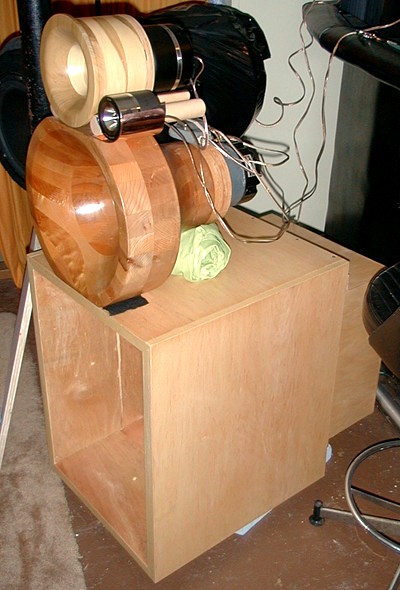
In the given example the system designer obviously fool himself. Still, there is something that made me to think about what I see in here. A midrange compression driver loaded into ~2000kHz horn and another compression driver loaded into ~300 kHz. I wonder what motivated the guy to do it? Drivers? Cut offs? Reasons? Results? Who knows…
Still the concept is interesting. I hope the guy did it not because he got an extra home somewhere on sale but because he had more noble reasons. Regrettably his time alignment techniques and his papier-mâché upperbass horn suggest that hi reasons had no sonic justifications…
Rgs,
Romy the caT
|
|
|
|
Posted by Romy the Cat on
08-09-2006
|
|

I got my pair of 1.5” to 250Hz trx-horns that I will be trying for my “Fundamental Channel” experiment. It will take a couple weeks to paint the thing and find out how to mount them. For a time being I have a few very interesting proposition how to crossover them and how to integrate them. It will be very interesting to play with it…
The caT
|
|
|
|
Posted by NBC on
08-11-2006
|
|
Hi Romy,
FYI: The previous photo of some unknown persons "pile o' horns" appears to be:
Upper midrange: 1" TAD TD-2002 mounted to 650Hz Edgarhorn
Supertweeter: Fostex T90A or T925A.
Lower midrange: 1.4" PM phenolic RCA MI-95XX series (i.e., 9548, 9584, 9448) with "salt shaker" phase plug, mounted to older version of Bruce's 300Hz tractrix.
Midbass horn: Edgar 100Hz.
Regarding the stated uniqueness of GOTO SG-570 among drivers for covering 300-2000Hz, the Altec 1.4" 290-series, JBL 2" 248X series, JBL 3" 2490 and RCA 1.4" MI-95XX series were all designed to cover this range. All of them use phenolic diaphragms, accept 2490 using 4" titanium dome, 3" throat and low 5:1 compression ratio.
GOTO Unit product description says SG-570 has Beryllium dome and frequency response of 100-6000Hz, but is designed for 200-1000Hz. The GOTO is probably the superior driver, but considering the $12,350/pr MSRP of the GOTO and the fact that its not exactly easy to audition these in the states, I I'll be sticking with these high value American alternatives.
By "plugless", are you saying you reverse mounted the S2 on your horn?
It will be very interesting to watch and understand as you attempt to integrate the knees of all your drivers.
Regards,
Neil
|
|
|
|
Posted by Romy the Cat on
08-11-2006
|
Yes, I have recognized those “flatted-ended” Edgarhorn Horns that I will be spending this weekend to correct. By "plugless" I meant that the phase plug will be removed in my fundamental channels as they would not be necessary in there and should provide a few theoretical benefits.
THe caT
|
|
|
|
Posted by NBC on
08-11-2006
|
|
By "flat ended", I assume you mean how the mouths of his current 650Hz and older 300Hz horns have flat edges, rather than even more gently rounded ones?
From memeory and a photo, Bruce's current 350Hz appears to be 'slightly' more rounded at the front edge and without a definate perimeter line visible. I imagine your 250Hz horns are the same.
How does the flat termination effect sound (e.g., diffraction), and how will you modify them?
LeCleac'h horns generally have very large, rounded, gradual horn mouth terminations. I can upload several photos of 340Hz and 204Hz 'Azura' horns (and graphs) I received from Martin Sedon, but perhaps that should wait for another thread discussing horn design, since this thread is about multi-horn integration.
Neil
|
|
|
|
Posted by Romy the Cat on
08-12-2006
|
|
The termination of the Bruce’ horns is funny to say at least. The red zone on the picture is completely bogusly unnecessary. I do not think that they hoe make horn for Bruce has any remote comprehension of what he does. Some of the Bruce horns that I have seen were terminated properly and I never even thought to discuses this requirement with Bruce’ but what I opened mine delivered I saw that same step-terminated flare. Only God in his infant wisdom knows why the hell they did it. Their step-termination dose not affect the size, marital spending or anything else – I think it is juts their habit to deal with clueless customer that enables them to do whatever they want.
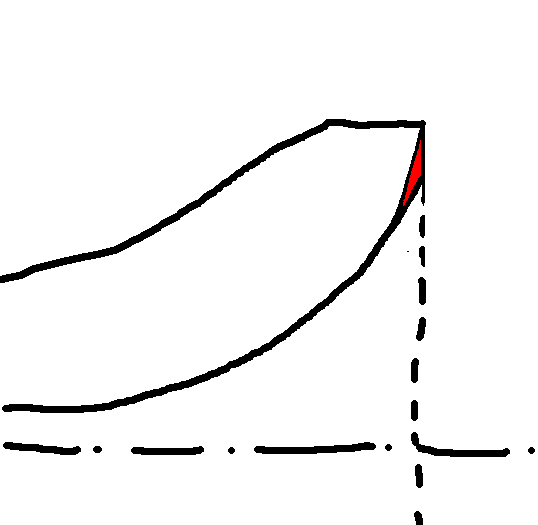
You see, a tratrix horn must be ended perpendicular, Bruce’s the step-termination does it but why we need that step on the edges of the flare? I have no idea if it affects sound, highly unlikely that is would in context of my 500Hz-1000Hz horn but the entire idea of a properly operating horn is gradual explanation without any steps. I spent almost 5 hours to sand down that rough step that I had there and to fix some other minor issues that the horns had. I still did not do it as perfect as I would like to have it ( I have not patience to do it) but it is much better then it was originally. (Similar to what you had in your pile of horns picture above). Here in on the picture below of the horns are after 3 layers of prime paint and patching the defects between the layers. It gives an idea tat it slightly smoother.
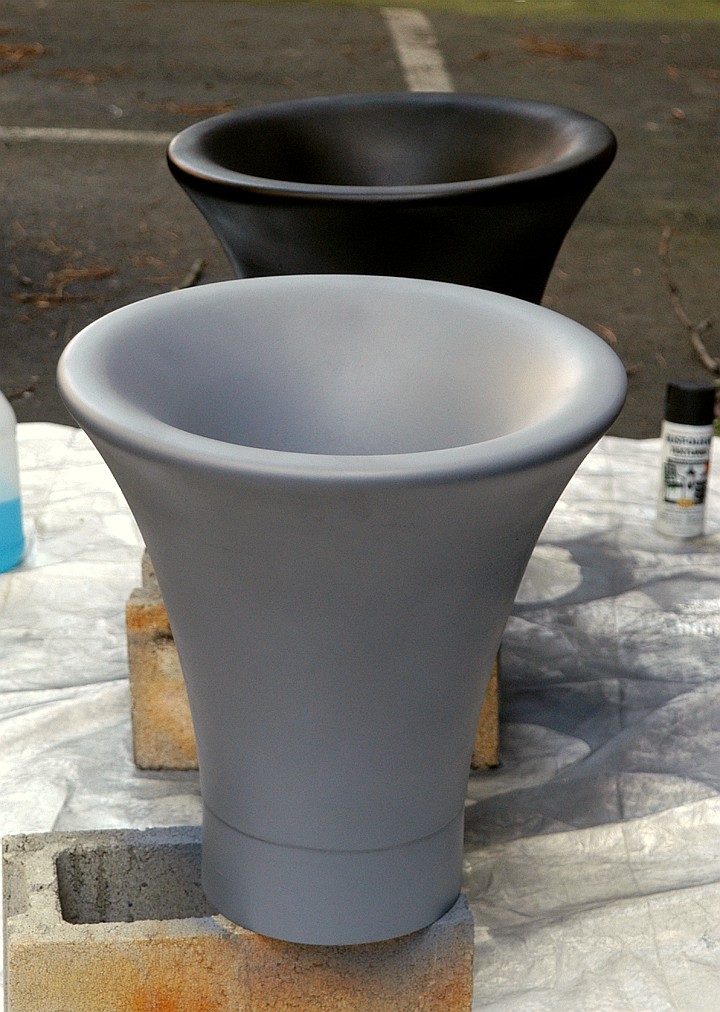
The caT
|
|
|
|
Posted by Romy the Cat on
08-12-2006
|
|
I did not expect that it would be so much work with the new “fundamental channel”. The new 250Hz horns required some help to correct some problems, plus they have to be finished in a civilized fashion and color. However, the biggest problem is position the new “fundamental channel” to make it work with Macondo, and perhaps eventually to become a new Macondo. I was trying the “fundamental channel” in many combinations but I did not like the results. Beside the integration problems it require new frame and I do not think that I would be able to make two horn frame as elegant as I have now for my MF. The lateral offset creates problems in nearfield. It is possible deal with it but it requires a long and very precise dialing in the crossover point to make the undetectable lateral offset undetectable.
I spent pretty much an entire Saturday to play with it. In the end I did tried one quite radical solution, ironically the one that heavily employ with original Macondo design – something that I call “arrayed coupling”, and it worked wonderfully.
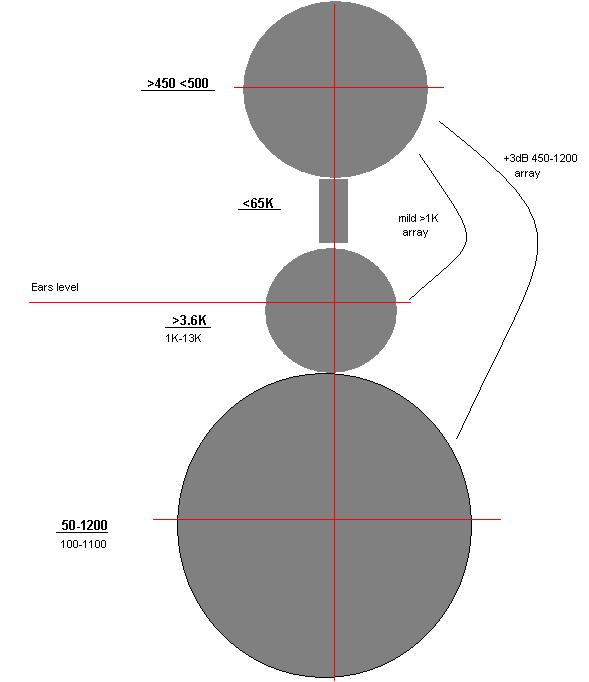
In the end I decided that the new “fundamental channel” will live atop the tweeter and I do have very cool idea how I can hang it there with a bulky and unwieldy frame. I think I will spend another day for further experiments and if everything works well then I will be able in couple days to start listening the thing and to start playing with crossovers and amplifiers…
The Cat
|
|
|
|
Posted by Romy the Cat on
08-13-2006
|
|
Eventually I found hot to balance out the fundamental channel’s arm a 1 galloon bucket filed with led shot and Super Melquiades power supply do a good contra-mass.
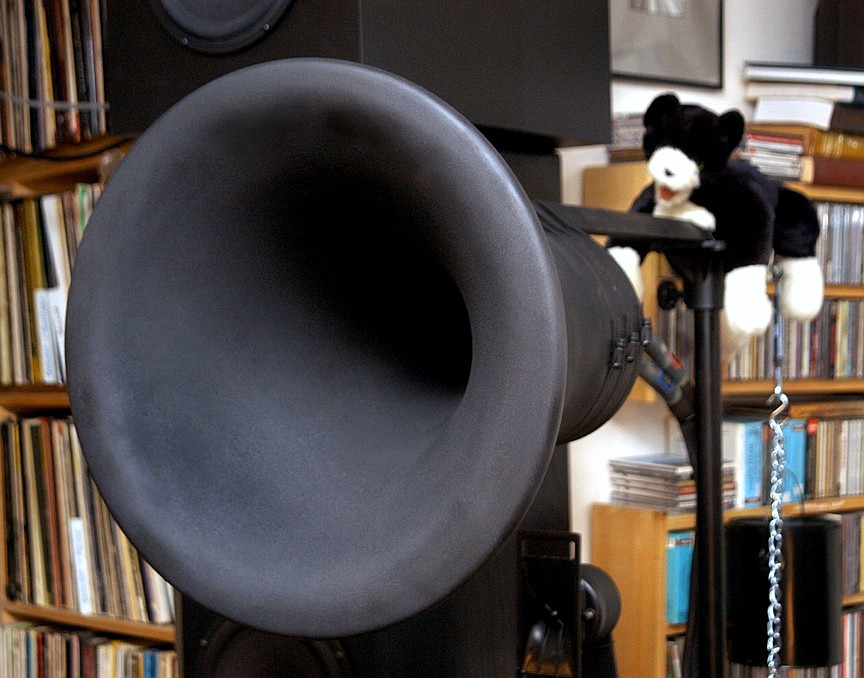
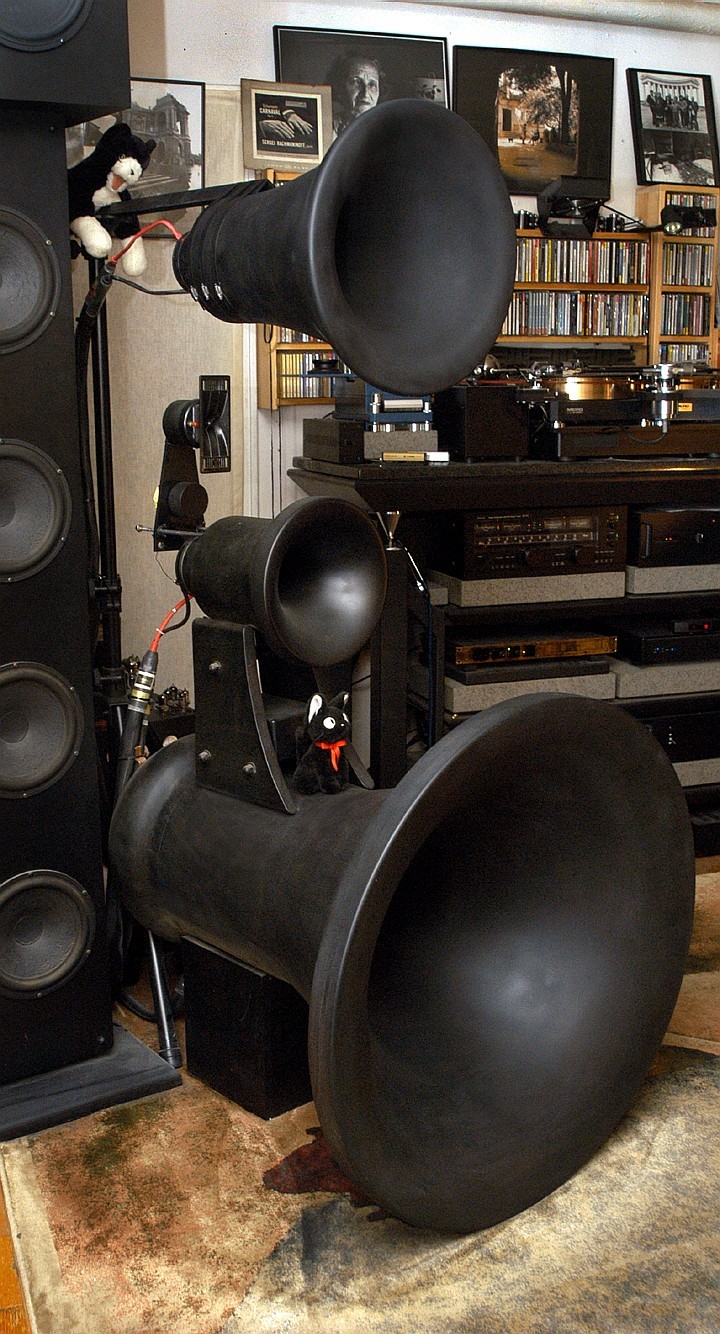
I did not do a lot of listening but the very initial listing that I did are clear indication that the S2 without a phase plug sounds horrible. I was kind of anticipation in somewhere in the end of my brain but I was hopping that it will be not the case and I will not be dealing with that extended HF. The S2 without the phase plug do not act as a compression driver and act as a very poor aluminum coned direct radiator load in a huge front chamber. What a horrible sound!
The cat
|
|
|
|
Posted by Romy the Cat on
08-14-2006
|
|
I had today the “fundamental channel” plug in and was trying to listen it. As usually I do, I connected juts one single crossovered “fundamental channel” to a single amp and try to live with it for a while. It usually takes for me a week or so to figure out how a channel behaves.
It took 3 times to align the S2’s cone quite miserable procedure. The horn turns out does not handle LF as good as I expected. The lowest I was able to go was 19uF against 15R or something around 550Hz, of course with the first order. The S2 can handle lower but the horn does not. Since I put the phase plug back the channel runs all the way up unfortunately. I was trying 700Hz, 800Hz and 900Hz, they all were fine. Sine I have a huge spare sensitivity in the channel I am planning to put it on the transition slop and let inductance to attenuate decibels. However, I do not know how a large coil of 40mHz would affect sound.
Conceptually it looks pretty promising so far and now I see that putting a complimentary channel in a virtual configuration was a very-very right direction to do. Although I did not try to integrate the channel but it looks like the vertical positioning will do no damage, quite an opposite…. To be continue…
The Cat
|
|
|
|
Posted by cv on
08-14-2006
|
|
R,
Little suggestion should all else fail - you could have a rudimentary phase plug machined that would give you the same (or similar) compression ratio as the original but only one annular exit path. This might preserve the driver characteristics at LF but attenuate HF.
Just a thought...
Following this with great interest in any case!
Cheers,
cv
|
|
|
|
Posted by NBC on
08-14-2006
|
...Or plug all but the desired LF exit path?
This might not have the same compression ratio a stock though.
Well, I am still learning about how phase plugs operate.
Neil
|
|
|
|
Posted by Romy the Cat on
08-14-2006
|
 cv wrote: cv wrote: | Little suggestion should all else fail - you could have a rudimentary phase plug machined that would give you the same (or similar) compression ratio as the original but only one annular exit path. This might preserve the driver characteristics at LF but attenuate HF.
|
|
Chris,
I was considering it but I do not know if it is would be necessary. The idea to try the S2 without the phase plug came to me last year when I was looking at the Cogent LF compression driver and the complicated metal work they put in the manufacturing of this plug. I asked myself why the hell the phase plug is necessary at all if the driver does not men to handle any HF? In case of the Cogent/RCA driver it very much might be the case as they have flexibility to maintain the compression ratio and to implement a different diaphragm-loading method (since the driver is manufactured form ground up). However, in my case, since I bound to S2 design I have to stay with what it is. To make a different plug is possible but the main question would be what kind? If I have a friend next door with ultimate patience and a machine shop or a turning machine in my basement then I would excrement with a few different one but it does not look as I have this opportunity. For a time being I decided to stay with default phases plug and play with filters. If a first order will not be strong enough I can always got for 1.5 order and see how it behaves, or for second order. It all will be obvious when I put both of the Vitavox S2 channels together and will look if the vertical image is moving up with frequency. If it stays, or moved at negligible distance (that I think it will be doing) then it will be sufficient enough roll of.
Rgs, Romy the Cat
|
|
|
|
Posted by Romy the Cat on
08-14-2006
|
|
It is good, very good. Actually I did not expect that it would be so easy and some resentful at the same time. I was running the new horn, juts single horn, listing it here and there, trying to get a precise high-pass crossover point. The 18.5uF turned out to be the very lower I was able to go. It has all that M-effect and P-effect but does not turning itself into honk. Adding 1uf more and the horn being to sound like Altec horns…
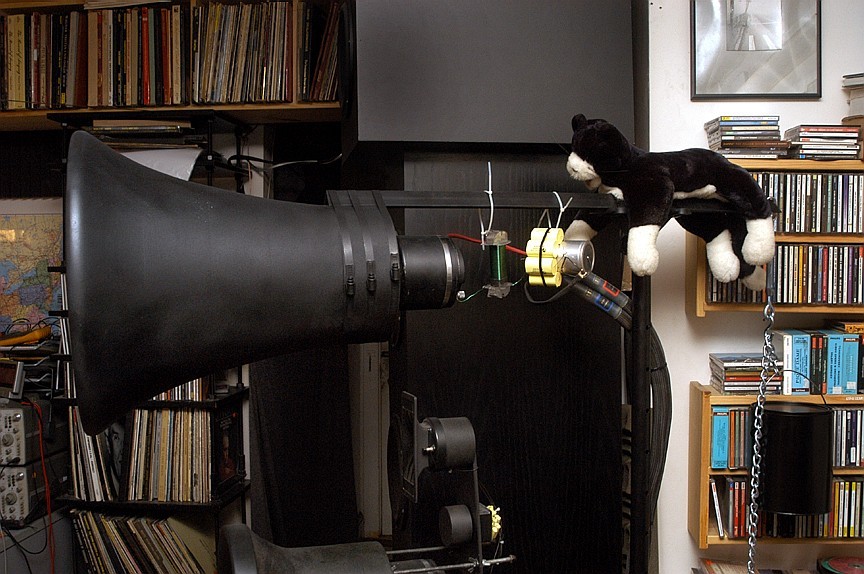
As I said I’m very surprised with how good it is. If you accustomed to listing any driver juts within one octave, (I do not even mention a horn channels – try it home and you will see how bad it would be), then you are familiar that telephone feeling and know that a driver should be decolorized, somehow compressed and congested. It should have a feeling that something is missing. Not with S2! Even in this radical bandpass it sound clean, surprisingly balanced and kind of strangely fulfilled. Did I mention THAT tone! The caT
|
|
|
|
Posted by Romy the Cat on
08-15-2006
|
|
Well, I loved, loved it loved it… but today I decided to experiment with integration the new horn into the system and learned that it would be far much complicated and take more efforts. Below are 3 sweeps form listening position, Firs is the new horn alone with 18.3uF and 3mH coil. Second is my Macondo alone. The third is Macondo and the new driver work together.
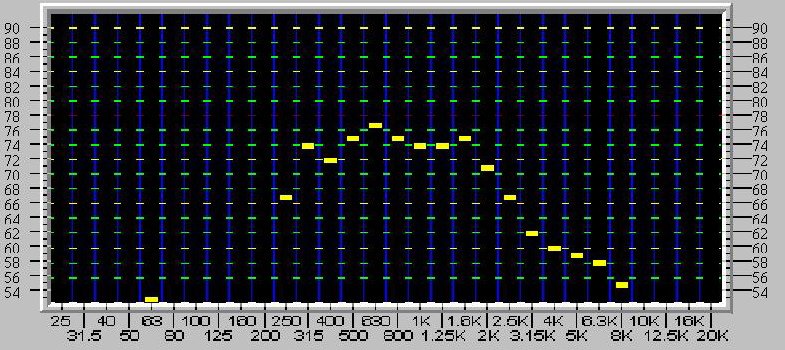
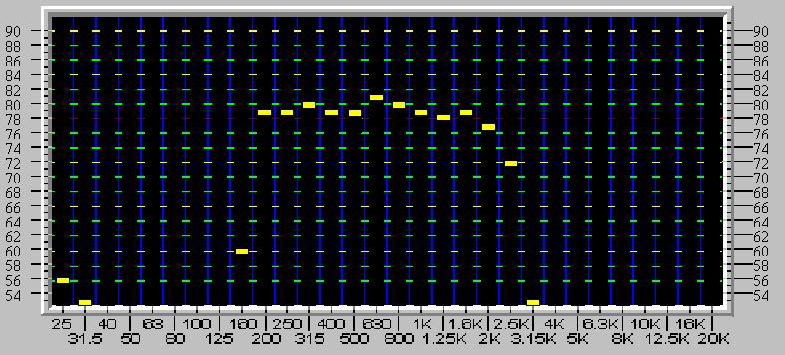
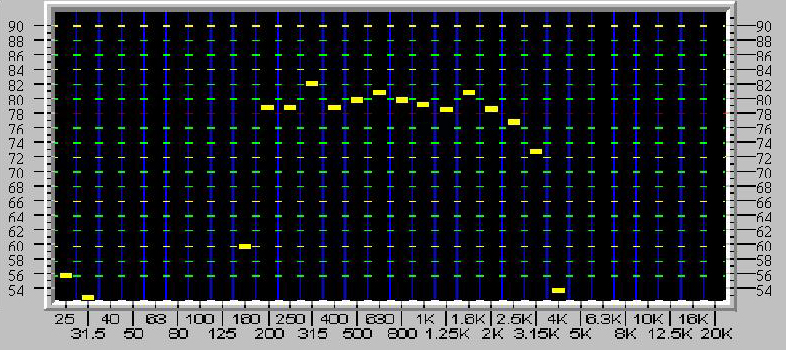
I have spent an hour (uselessly it takes for me minutes or even seconds) to listening quite completed material and frankly speaking I hate what I heard. I did some adjustments but the pure Macondo allays was more interesting. The new horn added some heaviness in sound. I was driving the volume of new channels down but even at minus 12dB (!!!) is feel that the new channel brings the elegance and chick if the Macondo upper bass and lower midrange down. Yes, sure the new channel creates a coupe dbs bulge at “heaviness zone”. However if I create the same bulge by my Macondo the upper bass channel than the bulge doe not bother me at all and practically not auditable.
The concussion is that most likely I need to roll off my upper bass sooner and sharper, reducing the penetration of the upper bass channel into the lower midrange channel. Also I have learned that the new channel much be ~ minus 6dB relative to the MF channels as if not then it does move the image up. I was playing Carlo Maria Giulini magnificent performance of Brahms 4th (nope, not with Chicago but with… Wiener in 1989, good luck to find it!). What could be more strings devastating then the late Brahms? The recording is compressed and quite “flat”. The Macondo with new driver converted it into such a horrendous mess that it would be shame to name. Ironically Macondo without the new channel or … the new channel along played the recording way better. The same is with my beloved Cello and Piano sonata by George Walker – with the new driver it was laughably poor until I was driving the new channel at minus 18dB (!)
What it boils down so far that it would requires much more precision to set the arrangement with new horns to operate properly, however I do not know if I get any benefits then. Defiantly I will continue to play with it and hopefully I will find some kind of wining setting but so far the result is not worthy.
Rgs,
Romy the caT
|
|